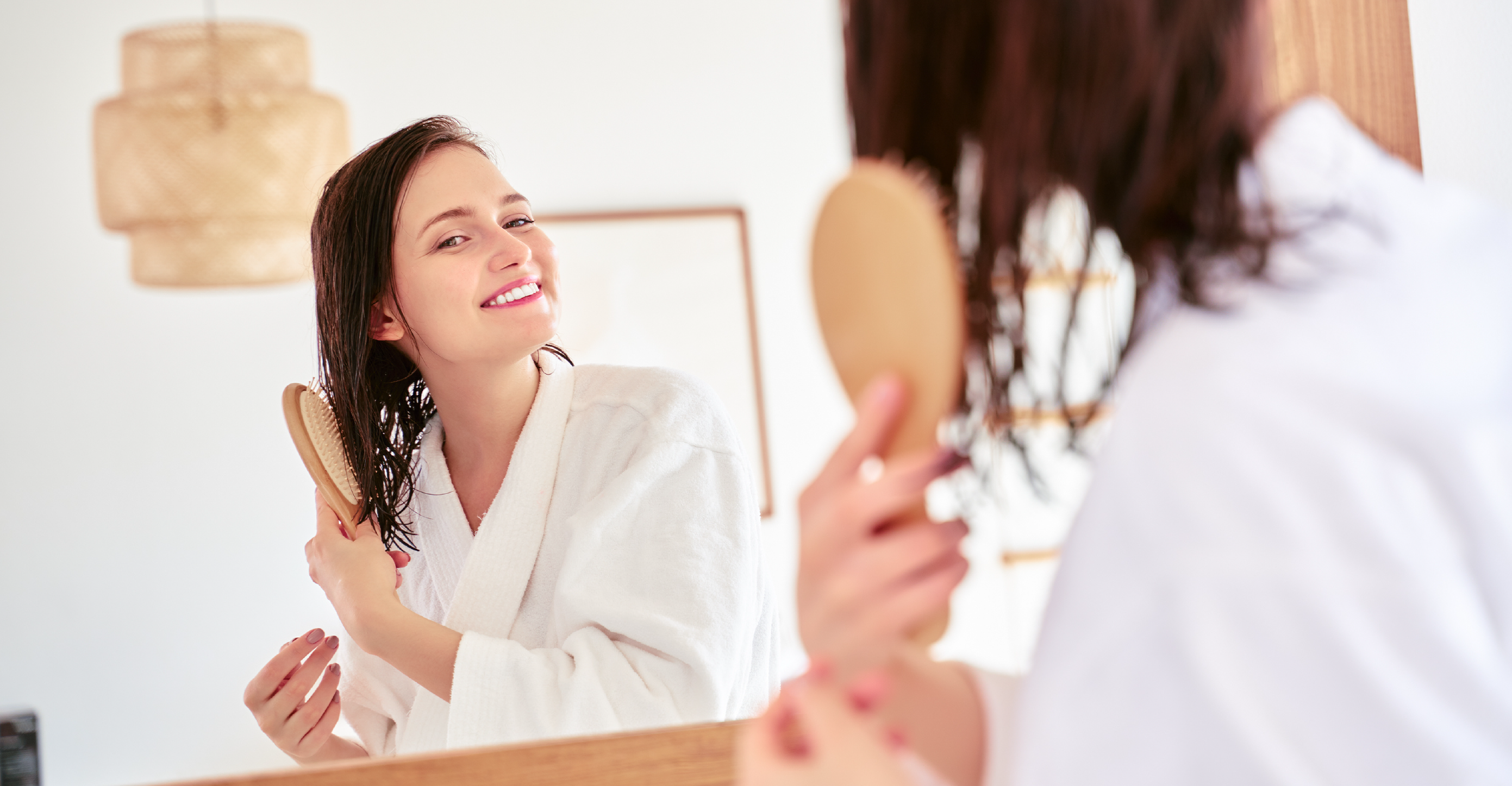Hair loss is a common worry for many men and women and can be caused by a variety of factors. When considering the possible reasons for hair loss, the role of vitamins in maintaining a full head of healthy hair is often overlooked. Getting the right amount of these essential nutrients is crucial for overall health and plays a significant role in the growth and maintenance of our hair follicles. When these essential nutrients are in short supply, it can lead to hair loss.
But which vitamin deficiencies cause hair loss? In this article, we’ll explore how deficiencies in key vitamins can impact your locks, shedding light on the important connection between nutrition and hair health.
Factors that Contribute to Hair Loss
Hair loss can stem from various factors, both internal and external. Understanding these contributing factors is crucial for addressing and managing hair loss effectively. Here are some key factors that can contribute to hair loss:
Genetics
Family history plays a significant role in determining your likelihood of experiencing hair loss. Androgenetic alopecia, commonly known as male-pattern baldness or female-pattern hair loss, is the most common type of hair loss and is influenced by genetic predisposition.
Hormonal Changes
Fluctuations in hormone levels can impact hair growth cycles. Conditions such as pregnancy, childbirth, menopause, thyroid disorders, and hormonal imbalances, including PCOS (in women), can contribute to hair loss.
Medical Conditions
Certain medical conditions and diseases can lead to hair loss as a symptom. Examples include alopecia areata, autoimmune diseases creating a compromised immune system, scalp infections (such as ringworm), trichotillomania (hair-pulling disorder), and chronic illnesses like lupus and diabetes.
Stress
Physical or emotional stress can disrupt the hair growth cycle, leading to a condition called telogen effluvium, where a significant number of hair follicles enter the resting phase prematurely, causing increased shedding.
Medications and Treatments
Certain medications and medical treatments, including chemotherapy, radiation therapy, antidepressants, blood thinners, and medications for high blood pressure, can cause temporary or permanent hair loss as a side effect.
Lifestyle Factors
Factors such as poor nutrition, crash dieting, excessive hairstyling or heat styling, frequent use of harsh chemicals (e.g., hair dyes, relaxers), tight hairstyles (e.g., ponytails, braids), and smoking can weaken the hair shaft and contribute to hair loss.
Age
As individuals age, hair naturally becomes finer and may begin to thin due to changes in hormone levels and decreased hair follicle regeneration.
Environmental Factors
Exposure to environmental pollutants, UV radiation, harsh weather conditions, and water quality (e.g., hard water) can impact hair health and contribute to hair loss.
Psychological Factors
Psychological conditions such as depression and anxiety can contribute to hair loss indirectly through behaviors like increased hair-pulling (trichotillomania) or neglect of self-care routines.
Which Vitamin Deficiencies Cause Hair Loss?
In addition to the factors outlined above, hair loss can be influenced by vitamin and mineral deficiencies. While several vitamins are essential for maintaining healthy hair growth, deficiencies in specific vitamins are particularly notable for their association with hair loss. Here are some key vitamins whose deficiencies are linked to hair loss:
Vitamin D
Adequate vitamin D levels are essential for hair follicle cycling and hair growth. Research shows that vitamin D deficiency may contribute to alopecia areata, a type of hair loss characterized by patches of baldness.
Biotin (Vitamin B7)
Biotin is often referred to as the “hair vitamin” due to its role in promoting healthy hair growth. A biotin deficiency can lead to brittle hair and hair loss.
Vitamin A
While vitamin A is necessary for hair cell growth, excessive intake of vitamin A or vitamin A deficiency can contribute to hair loss. Finding the right balance is crucial for maintaining healthy hair.
Vitamin E
Vitamin E is an antioxidant that promotes blood circulation and supports a healthy scalp. Its deficiency may contribute to poor hair health and increased hair loss.
Vitamin B12
Vitamin B12 is essential for red blood cell production and nerve function, including those related to the scalp and hair follicles. Deficiency in vitamin B12 can lead to premature hair loss and thinning.
Iron
Iron deficiency, also known as anemia, is a common cause of hair loss, especially in women. Iron is necessary for the production of hemoglobin, which carries oxygen to hair follicles. Insufficient iron levels can disrupt this process and lead to hair shedding.
Zinc
Zinc plays a role in maintaining hair structure and supporting hair follicle health. Zinc deficiency can lead to hair thinning and increased shedding.
Vitamin C
Vitamin C is an antioxidant supporting collagen production, essential for hair structure and strength. Deficiency in vitamin C may contribute to hair breakage and slow hair growth cycles.
While deficiencies in these vitamins can contribute to hair loss, consulting with a healthcare professional to determine an underlying cause is essential. In general, please consult with a doctor before adding vitamins into your daily routine, as excessive intake can also have adverse effects.
How to Prevent Hair Loss
Preventing hair loss involves a combination of lifestyle changes, such as a healthy diet, exercise, and hydration, alongside proper hair care practices and addressing underlying health issues. Here are some effective ways to prevent hair loss:
Avoid Tight Hairstyles
Avoid hairstyles that pull on the hair follicles, such as tight ponytails, braids, and buns, as they can lead to traction alopecia—a form of hair loss caused by excessive tension on the hair.
Be Gentle with Wet Hair
Wet hair is more susceptible to damage, so handle it with care. Use a wide-tooth comb or a detangling brush to gently remove knots and tangles, starting from the ends and working your way up.
Limit Heat Styling
Minimize the use of heat styling tools such as hairdryers, flat irons, and curling wands, as excessive heat can weaken the hair shaft and lead to breakage. When using heat styling tools, apply a heat protectant spray to minimize damage.
Avoid Overprocessing
Limit the use of harsh chemical treatments such as bleaching, perming, and coloring, as they can damage the hair and contribute to hair loss. If possible, opt for gentler alternatives or give your hair a break from chemical treatments.
Use Gentle Hair Care Products
Choose mild, sulfate-free shampoos and conditioners that suit your hair type and scalp condition. Avoid products containing harsh chemicals that can strip away natural oils and cause dryness.
Address Underlying Health Issues
Certain medical conditions and hormonal imbalances can contribute to hair loss. Consult with a healthcare professional to address any underlying health issues and explore treatment options if necessary.
By incorporating these preventive measures into your hair care routine and addressing any underlying health issues, you can reduce the risk of hair loss and maintain healthy, vibrant hair.
Try Uscriptives’ Healthy Hair, Skin, & Nails!
If you’re struggling with hair loss related to a vitamin deficiency, there’s hope! Uscriptives offers a solution with their Healthy Hair, Skin & Nails Formula—a carefully crafted blend of vitamins, minerals, and nutrients designed to support vibrant hair growth and overall hair health.
By incorporating supplements like Uscriptives’ Healthy Hair, Skin & Nails Formula into your daily routine, you can provide your body with the essential nutrients it needs to promote healthy hair follicles, combat deficiencies, and enhance your natural beauty from the inside out.
Explore our wide range of vitamins and discover a formula that’s right for you when you visit our website.
Publisher: Source link



